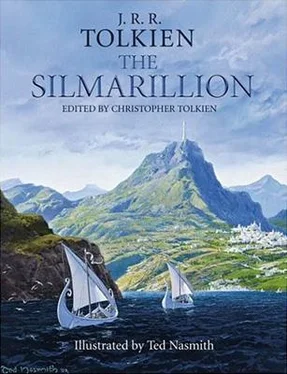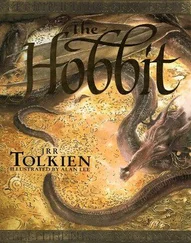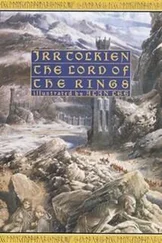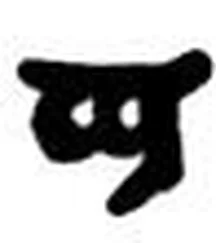fea 'spirit' in Fëanor, Fëanturi.
fin- 'hair' in Finduilas, Fingon, Finrod, Glorftndel.
formen 'north' (Quenya) in Formenos; Sindarin forn (also for , forod ) in Fornost.
fuin 'gloom, darkness' (Quenya huine) in Fuinur, Taur-nu-Fuin.
gaer 'sea' in Belegaer (and in Gaerys, Sindarin name of Ossë). Said to derive from the stem gaya 'awe, dread', and to have been the name made for the vast and terrifying Great Sea when the Eldar first came to its shores.
gaur 'werewolf (from a root ngwaw- 'howl') in Tol-in-Gaurhoth.
gil 'star' in Dagor-nuin-Giliath, Osgiliath ( giliath 'host of stars'); Gil-Estel, Gil-galad.
girith 'shuddering' in Nen Girith; cf. also Girithron, name of the last month of the year in Sindarin ( The Lord of the Rings Appendix D).
glin 'gleam' (particularly applied to the eyes) in Maeglin.
golodh is the Sindarin form of Quenya Noldo; see gûl . Plural Golodhrim, and Gelydh (in Annon-in-Gelydh ).
gond 'stone' in Gondolin, Gondor, Gonnhirrim, Argonath, seregon. The name of the hidden city of King Turgon was devised by him in Quenya as Ondolindë (Quenya ondo= Sindarin gond, and lindë 'singing, song'); but it was known always in legend in the Sindarin form Gondolin, which was probably interpreted as gond-dolen 'Hidden Rock'.
gor 'horror, dread' in Gorthaur, Gorthol; goroth of the same meaning, with reduplicated gor, in Gorgoroth, Ered Gorgoroth.
groth (grod) 'delving, underground dwelling' in Menegroth, Nogrod (probably also in Nimrodel, 'lady of the white cave'). Nogrod was originally Novrod 'hollow delving' (hence the translation Hollowbold ) , but was altered under the influence of naug 'dwarf'.
gul 'sorcery' in Dol Guldur, Minas Morgul. This word was derived from the same ancient stem ngol- that appears in Noldor; cf. Quenya nólë 'long study, lore, knowledge'. But the Sindarin word was darkened in sense by its frequent use in the compound morgul 'black arts'.
gurth 'death' in Gurthang (see also Melkor in the Index).
gwaith 'people' in Gwaith-i-Mírdain; cf. Enedwaith 'Middle-folk', name of the land between the Greyflood and the Isen.
gwalh, wath 'shadow' in Deldúwath, Ephel Dúath; also in Gwathlo, the river Greyflood in Eriador. Related forms in Ered Wethrin, ThurIngwëthil. (This Sindarin word referred to dim light, not to the shadows of objects cast by light: these were called morchaint 'dark shapes'.)
hadhod in Hadhodrond (translation of Khazad-dûm) was a rendering of Khazâd into Sindarin sounds.
haudh 'mound' in Haudh-en-Arwen, Haudh-en-Elleth, etc.
heru 'lord' in Herumor, Herunúmen; Sindarin hir in Gonnhirrim, Rohirrim, Barahir; híril 'lady' in Hírilorn.
him 'cool' in Himlad (and Himring? ) .
hîn 'children' in Eruhini 'Children of Eru'; Narn i Hîn Húrin.
hith 'mist' in Hithaeglir, Hithlum (also in Nen Hithoel, a lake in Anduin). Hithlum is Sindarin in form, adapted from the Quenya name Hísilómë given by the Noldorin exiles (Quenya hísië 'mist', cf. Hísimë, the name of the eleventh month of the year. The Lord of the Rings Appendix D).
hoth 'host, horde' (nearly always in a bad sense) in Tol-in-Gaurhoth; also in Loss(h)oth, the Snowmen of Forochel ( The Lord of the Rings Appendix A [I, iii]) and Glamhoth 'din-horde', a name for Orcs.
hyarmen 'south' (Quenya) in Hyarmentir; Sindarin har-, harn, harad.
ia 'void, abyss' in Moria.
iant 'bridge' in Iant Iaur.
iâth 'fence' in Doriath.
iaur 'old' in Iant Iaur; cf. the Elvish name of Bombadil, Iarwain.
ilm- This stem appears in Ilmen, Ilmarë, and also in Ilmarin ('mansion of the high airs', the dwelling of Manwë and Varda upon Oiolossë).
ilúvë 'the whole, the all' in Ilúvatar.
kal' (gal-) This root, meaning 'shine', appears in Calacirya, Calaquendi, Tar-Calion; galvorn, Gil-galad, Galadriel. The last two names have no connexion with Sindarin galadh tree', although in the case of Galadriel such a connexion was often made, and the name altered to Galadhriel. In the High-elven speech her name was Al(a)táriel, derived from alata 'radiance' (Sindarin galad ) and riel 'garlanded maiden' (from a root rig- 'twine, wreathe'): the whole meaning 'maiden crowned with a radiant garland', referring to her hair. calen (galen) 'green' is etymologically 'bright', and derives from this root; see also aglar.
káno 'commander': this Quenya word is the origin of the second element in Fingon and Turgon.
kel- 'go away', of water 'flow away, flow down', in Celon; from et-kele 'issue of water, spring' was derived, with transposition of the consonants, Quenya ehtele, Sindarin eithel.
kemen 'earth' in Kementári; a Quenya word referring to the earth as a flat floor beneath menel, the heavens.
kheliek- 'ice' in Helcar, Helcaraxë (Quenya helka 'icy, ice-cold'). But in Helevorn the first element is Sindarin heledh 'glass', taken from Khuzdul kheled (cf. Kheled-zaram 'Mirrormere'); Helevorn means 'black glass' (cf. galvorn ) .
khil- 'follow' in Hildor, Hildórien, Eluchíl.
kir- 'cut, cleave' in Calacirya, Cirth, Angerthas, Cirith ( Ninniach, Thoronath ) . From the sense 'pass swiftly through' was derived Quenya círya 'sharp-prowed ship' (cf. English cutter), and this meaning appears also in Círdan, Tar-Ciryatan, and no doubt in the name of Isildur's son Círyon.
lad 'plain, valley' in Dagorlad, Himlad; imlad a narrow valley with steep sides, in Imladris (cf. also Imlad Morgul in the Ephel Dúath).
laure 'gold' (but of light and colour, not of the metal) in Laurelin; the Sindarin forms in Glóredhel, Glorfindel, Loeg Ningloron, Lórindol, Rathlóriel.
lhach 'leaping flame' in Dagor Bragollach, and probably in Anglachel (the sword made by Eöl of meteoric iron).
lin (1) 'pool, mere' in Linaewen (which contains aew [Quenya aiwe ] 'small bird'), Teiglin; cf. aelin.
lin- (2) This root, meaning 'sing, make a musical sound', occurs in Ainulindalë, Laurelin, Lindar, Lindon, Ered Lindon, lómelindi.
lith 'ash' in Anfauglith, Dor-nu-Fauglith; also in Ered Lithui, the Ashen Mountains, forming the northern border of Mordor, and Lithlad 'Plain of Ashes' at the feet of Ered Lithui.
lok- 'bend, loop' in Urulóki (Quenya [ h ] lókë 'snake, serpent', Sindarin Ihûg ) .
Читать дальше










